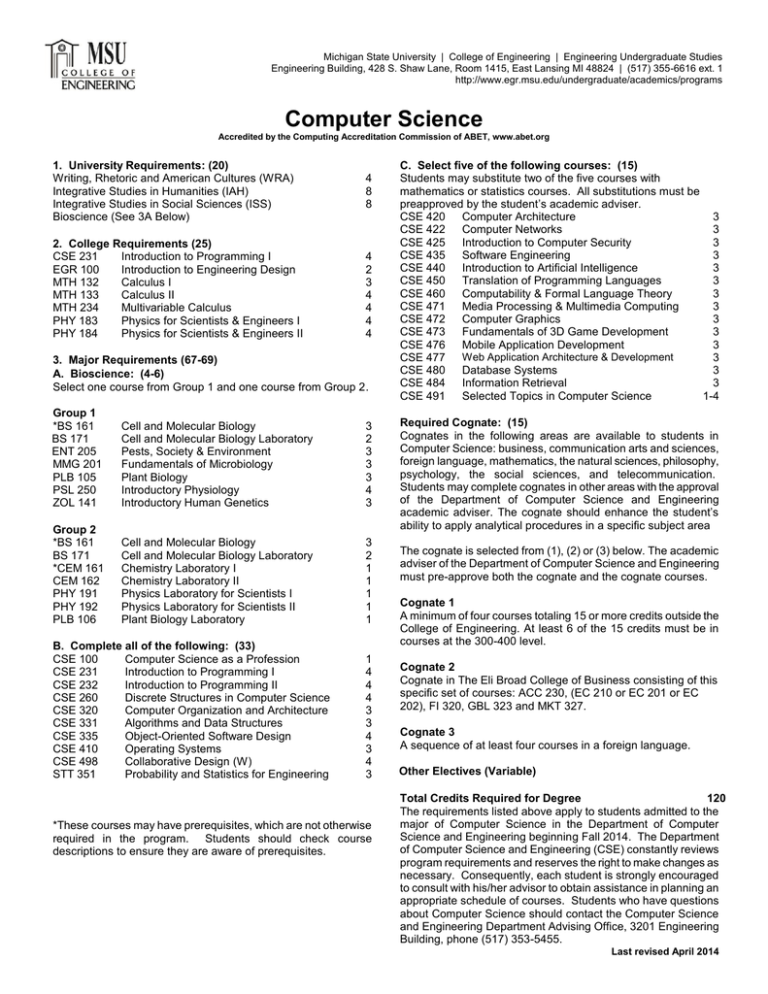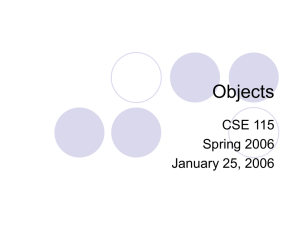1410 Engineering Building - College of Engineering, Michigan State
advertisement

Michigan State University | College of Engineering | Engineering Undergraduate Studies Engineering Building, 428 S. Shaw Lane, Room 1415, East Lansing MI 48824 | (517) 355-6616 ext. 1 http://www.egr.msu.edu/undergraduate/academics/programs Computer Science Accredited by the Computing Accreditation Commission of ABET, www.abet.org 1. University Requirements: (20) Writing, Rhetoric and American Cultures (WRA) Integrative Studies in Humanities (IAH) Integrative Studies in Social Sciences (ISS) Bioscience (See 3A Below) 2. College Requirements (25) CSE 231 Introduction to Programming I EGR 100 Introduction to Engineering Design MTH 132 Calculus I MTH 133 Calculus II MTH 234 Multivariable Calculus PHY 183 Physics for Scientists & Engineers I PHY 184 Physics for Scientists & Engineers II 4 8 8 4 2 3 4 4 4 4 3. Major Requirements (67-69) A. Bioscience: (4-6) Select one course from Group 1 and one course from Group 2. Group 1 *BS 161 BS 171 ENT 205 MMG 201 PLB 105 PSL 250 ZOL 141 Cell and Molecular Biology Cell and Molecular Biology Laboratory Pests, Society & Environment Fundamentals of Microbiology Plant Biology Introductory Physiology Introductory Human Genetics 3 2 3 3 3 4 3 Group 2 *BS 161 BS 171 *CEM 161 CEM 162 PHY 191 PHY 192 PLB 106 Cell and Molecular Biology Cell and Molecular Biology Laboratory Chemistry Laboratory I Chemistry Laboratory II Physics Laboratory for Scientists I Physics Laboratory for Scientists II Plant Biology Laboratory 3 2 1 1 1 1 1 B. Complete all of the following: (33) CSE 100 Computer Science as a Profession CSE 231 Introduction to Programming I CSE 232 Introduction to Programming II CSE 260 Discrete Structures in Computer Science CSE 320 Computer Organization and Architecture CSE 331 Algorithms and Data Structures CSE 335 Object-Oriented Software Design CSE 410 Operating Systems CSE 498 Collaborative Design (W) STT 351 Probability and Statistics for Engineering 1 4 4 4 3 3 4 3 4 3 *These courses may have prerequisites, which are not otherwise required in the program. Students should check course descriptions to ensure they are aware of prerequisites. C. Select five of the following courses: (15) Students may substitute two of the five courses with mathematics or statistics courses. All substitutions must be preapproved by the student’s academic adviser. CSE 420 Computer Architecture 3 CSE 422 Computer Networks 3 CSE 425 Introduction to Computer Security 3 CSE 435 Software Engineering 3 CSE 440 Introduction to Artificial Intelligence 3 CSE 450 Translation of Programming Languages 3 CSE 460 Computability & Formal Language Theory 3 CSE 471 Media Processing & Multimedia Computing 3 CSE 472 Computer Graphics 3 CSE 473 Fundamentals of 3D Game Development 3 CSE 476 Mobile Application Development 3 Web Application Architecture & Development CSE 477 3 CSE 480 Database Systems 3 CSE 484 Information Retrieval 3 CSE 491 Selected Topics in Computer Science 1-4 Required Cognate: (15) Cognates in the following areas are available to students in Computer Science: business, communication arts and sciences, foreign language, mathematics, the natural sciences, philosophy, psychology, the social sciences, and telecommunication. Students may complete cognates in other areas with the approval of the Department of Computer Science and Engineering academic adviser. The cognate should enhance the student’s ability to apply analytical procedures in a specific subject area The cognate is selected from (1), (2) or (3) below. The academic adviser of the Department of Computer Science and Engineering must pre-approve both the cognate and the cognate courses. Cognate 1 A minimum of four courses totaling 15 or more credits outside the College of Engineering. At least 6 of the 15 credits must be in courses at the 300-400 level. Cognate 2 Cognate in The Eli Broad College of Business consisting of this specific set of courses: ACC 230, (EC 210 or EC 201 or EC 202), FI 320, GBL 323 and MKT 327. Cognate 3 A sequence of at least four courses in a foreign language. Other Electives (Variable) Total Credits Required for Degree 120 The requirements listed above apply to students admitted to the major of Computer Science in the Department of Computer Science and Engineering beginning Fall 2014. The Department of Computer Science and Engineering (CSE) constantly reviews program requirements and reserves the right to make changes as necessary. Consequently, each student is strongly encouraged to consult with his/her advisor to obtain assistance in planning an appropriate schedule of courses. Students who have questions about Computer Science should contact the Computer Science and Engineering Department Advising Office, 3201 Engineering Building, phone (517) 353-5455. Last revised April 2014 Michigan State University | College of Engineering | Engineering Undergraduate Studies Engineering Building, 428 S. Shaw Lane, Room 1415, East Lansing MI 48824 | (517) 355-6616 ext. 1 http://www.egr.msu.edu/undergraduate/academics/programs Computer Science Accredited by the Computing Accreditation Commission of ABET, www.abet.org Sample Program Freshman Year Fall CSE 100 EGR 100 Elect/Cognate ISS 2XX MTH 132 Total Credits 1 2 3 4 3 13 Spring CSE 231 Elect/Cog MTH 133 WRA 1XX Total Sophomore Year Credits 4 3 4 4 15 Fall CSE 232 CSE 260 IAH 201-210 PHY 183 Total Junior Year Fall CSE 331 CSE 410 IAH 211 or higher Elect/Cognate STT 351 Total Credits 3 3 4 3 3 16 Spring Biosci/Lab Elect/Cog CSE 4XX CSE 4XX ISS 3XX Total Credits 4 4 4 4 Spring CSE 320 CSE 335 MTH 234 PHY 184 16 Total Credits 3 4 4 4 15 Senior Year Credits 4 3 3 3 4 17 Fall CSE 4XX CSE 4XX Elect/Cog Elect/Cog Elect/Cog Total Credits 3 3 3 3 3 15 Spring CSE 4XX CSE 498 Elect/Cog Elect/Cog Total Credits 3 4 3 3 13 Program Objectives A graduate of the MSU Computer Science Program is prepared to be Successful in a computing-related profession, or Successful in graduate study. To achieve these objectives the department prepares students in the application of fundamental computing principles and software development skills. This preparation includes the design and implementation of systems that solve complex problems. Our graduates will be trained in teamwork, effective communication, professionalism, ethics, and the engagement of learning and applying new ideas and technologies as the field evolves. Last revised April 2014

